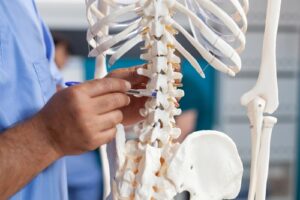If you experience a spine injury after a car accident, it may cause catastrophic and life-changing consequences. Trauma to your cervical, lumbar, or thoracic spine can damage or even sever the spinal cord and result in paralysis from the point of the injury down. It is estimated that motor vehicle accidents cause around 40% of these injuries.
The medical treatment received after a spinal injury can also impact a lawsuit, life care plan, and future damages. This is because spinal injuries often result in issues that will impact a person for the rest of their life.
The Most Common Spinal Cord Injuries
It is important to note that not all spinal injuries are the same. Damage to the spinal cord, and how it effects the body, can vary greatly by where it occurs, how severe it is, and the type of injury. Understanding the type of spinal injury you sustain can help you understand what is needed to meet your ongoing care needs.
The most common spinal cord injuries seen in car accident cases include the following:
Injury to the Cervical Spine
This type of injury occurs when there is damage to the spine between the cervical vertebra one through eight (C1 to C8). A cervical spinal cord injury can result in weakness in the legs and arms, paralysis, and tetraplegia or quadriplegia.
This part of your spine is also responsible for controlling nerve signals to the diaphragm, shoulders, neck, hands, arms, and back of the head. If a car accident victim experiences this type of spinal injury, they may have to wear a neck stabilizing device or deal with bladder and bowel control issues. Other complications include sexual dysfunction, respiratory problems, and more.
Injury to the Thoracic Spine
The thoracic vertebra can also experience trauma and damage in a car accident. If this type of injury occurs, it can cause weakness or paralysis in the legs, which is called paraplegia. This may cause the loss of sensation, sexual functioning, and bowel and bladder control.
Injury to the Lumbar Spine
Paraplegia may also occur if the spinal cord is damaged on the lumbar spine. A car accident victim diagnosed with paraplegia from a lumbar spinal injury can experience issues like impaired bowel and bladder control, loss of sensation, and sexual dysfunction.
Injury to the Sacral Spine
This part of the spinal cord sends nerve signals to the genitals, feet, lower legs, and thighs. Because of this, accident victims who damage their sacral vertebrae may experience sexual dysfunction, bladder and bowel dysfunction, and paralysis of the hips and legs.
Spinal cord injuries can be “complete” or “incomplete.” With an incomplete injury, the nerves can still relay messages. Sometimes the sensation is extremely faint, but the signal is still sent and received.
A complete spinal cord injury means there is no motor or sensory function below where the injury occurred on the spine.
Recovering Compensation for a Car Accident Caused Spinal Cord Injury
It is estimated that hundreds of thousands of people in the United States currently live with spinal cord injuries. The cost to treat these injuries can be significant – especially if the individual sustained the injury at a younger age.
If you or someone in your family experienced a spinal cord injury in a car accident caused by another person’s neglect, you might be able to recover compensation for some of the following losses:
- Property damage
- All medical costs related to the injury and medical treatment or care
- Pain and suffering
- Lost wages
- Mental anguish
- Loss of earning potential
- Loss of enjoyment of life
- Disability
- Reduced quality of life
We can review the facts of your case and situation to determine the specific damages you may qualify for. Our legal team will work to ensure you receive the full value of your injury.
Contact Our Car Accident Attorney for Help with Your Accident Claim
As you can see, the impact of a spinal cord injury after a car accident can be severe. It can also greatly impact your life and your family’s life.
If you find yourself in this situation, our legal team is here to help. We can review the facts of your case and help you recover the compensation you are entitled to. Contact us for a free consultation.





